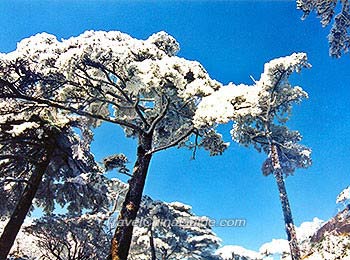Most parts of China have been hit unexpectedly by a cold spell since January 22nd, 2016. With a 5 to 10 degree centigrade drop in temperature, many provinces witnessed the lowest temperature in over a decade and experienced a period of rain and snow. Nanning, the capital of Guangxi Autonomous Region, even had the 1st snow on record.
According to the National Meteorological Center, the cold spell will linger for a few more days and end after January 27th. However, it's forecast that there will be another temperature drop around the Chinese New Year, possibly from February 6th to 8th.
|
|
Some Attractions Closed While Some Became White Fairylands
It's reported that 40 scenic spots in Hangzhou are temporarily closed and the date for resuming operation is unknown. The 40 scenic spots include Xixi National Wetland Park, Thousand Islet Lake and the Leifeng Pagoda, while the West Lake is excluded.
In Anhui, the whole province was covered by heavy snow, causing an economic loss of CNY 37.3 million. The famous Buddhist Mount Jiuhua has already been blocked. In addition, the main peak of Tianzhu Mountain stopped to receive visitors from January 21st.
However, the snow covered up some scenic spots with a white cloak, endowing them with an unusually beautiful scenery. The Yellow Mountain is now a wholly white world, where tourists are deeply impressed by the magnificent view. Likewise, Guilin also presents stunning landscapes in a snow world.
 Tip: Before heading for a tourist attraction, please double check whether it is open if the weather is bad.
Tip: Before heading for a tourist attraction, please double check whether it is open if the weather is bad.
Trains Arrived Late
 Tip: Passengers are advised to keep an eye on the real-time train schedule and bring some food while traveling in case that it delays. Also, set off for the station earlier than usual if road conditions are bad.
Tip: Passengers are advised to keep an eye on the real-time train schedule and bring some food while traveling in case that it delays. Also, set off for the station earlier than usual if road conditions are bad.
Flight Delayed or Cancelled
 Tip: Passengers please contact the airline before going to the airport to confirm that the flight will run normally.
Tip: Passengers please contact the airline before going to the airport to confirm that the flight will run normally.
Road Traffic Control Adopted
 Tip: It is recommended to travel by train rather than buses in bad weather for safety reasons.
Tip: It is recommended to travel by train rather than buses in bad weather for safety reasons.

